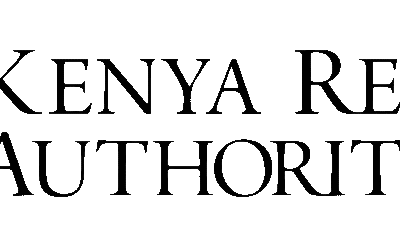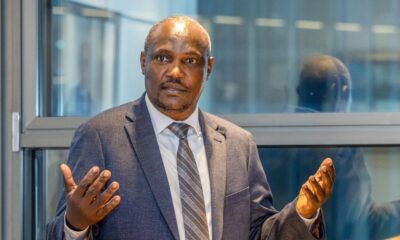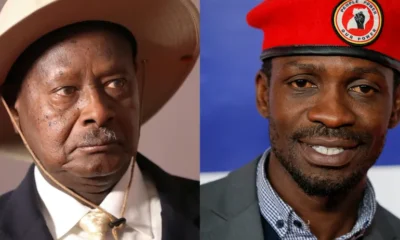Elections & Political Transitions
Museveni’s 2026 Bid Puts Uganda at Crossroads
At 81, Museveni is seeking another term as Uganda’s leader, setting the stage for a historic four-decade presidency. Opposition groups say the contest won’t be fair under his government.
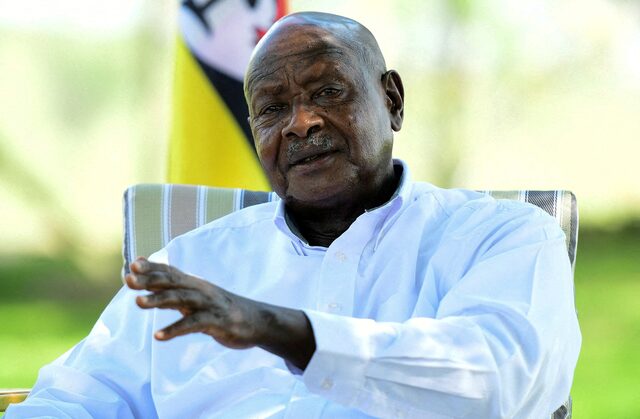
Uganda’s Yoweri Museveni, in power since 1986, faces rising opposition, economic anger, and youth discontent as he seeks re-election in 2026.
Museveni’s 2026 Bid Puts Uganda at Crossroads
Uganda’s President Yoweri Museveni will contest the 2026 election after the Electoral Commission cleared him to run. The move, announced on September 23, extends his four-decade grip on power and positions him to join the ranks of the world’s longest-serving leaders.
Museveni, 80, seized control in 1986 after a guerrilla war. He promised to end the cycle of leaders overstaying their welcome. Nearly 40 years later, he has rewritten the constitution to remove term and age limits, securing repeated re-election bids.
Rising Opposition
Museveni will likely face Bobi Wine, a pop star-turned-politician who commands deep support among Uganda’s youth. Wine insists Museveni relies on repression, not popularity, to maintain power. “The climate of fear is deeper than at any time in the past decade,” he told AP News.
Uganda’s opposition claims the government uses arrests, intimidation, and digital surveillance to silence dissent. A Human Rights Watch report documented arbitrary detentions and harassment of activists in 2025. Civil groups also warn of growing online censorship as authorities monitor political debate on social media.
An Afrobarometer survey found most Ugandans value multiparty democracy, yet nearly half doubt the fairness of elections.
Economic Fault Lines
Museveni often points to roads, schools, and energy projects as proof of progress. His government also bets on a long-delayed oil project expected to boost revenues in 2026. Officials predict growth could hit double digits once oil exports begin.
But many Ugandans feel left out. Food and fuel prices remain high. A study by AllAfrica showed two-thirds of university graduates were still jobless two years after finishing school.
The coffee industry, Uganda’s top export earner, has also soured. Farmers accuse the state of mishandling reforms and leaving them vulnerable to market shocks, according to The Africa Report.
Institutions Under Strain
Museveni has reshaped Uganda’s institutions to secure control. In early 2025, Parliament restored the power of military courts to try civilians, despite a Supreme Court ruling that limited such trials. Legal scholars told AP the move eroded judicial independence and tilted the balance of power toward the executive.
These shifts raise questions about legitimacy. Critics argue that while Museveni may win another term legally, the fairness of the system remains in doubt.
The Opposition’s Challenge
Wine promises to turn economic frustration into votes. He told Africanews that he plans to mobilize a “protest vote” that cuts across rural and urban divides.
But opposition unity remains weak. Analysts quoted by NTV Uganda doubt rival parties will rally behind one candidate, giving Museveni an advantage.
Security concerns add another layer. Opposition leaders report constant threats. Rights groups accuse the government of targeting dissenters. The ruling National Resistance Movement counters that it only enforces law and order.
A Battle of Generations
Museveni’s legacy resonates most in rural areas, where many credit him with ending decades of war and expanding healthcare. Older voters see him as the guarantor of stability in a volatile region, notes AP.
But Uganda’s population has changed. More than 70% of citizens are under 35. They judge Museveni less on his wartime record and more on the corruption scandals, unemployment rates, and shrinking freedoms they live with daily.
What’s at Stake
Uganda’s 2026 vote is more than a contest between two men. It is a test of whether long-serving leaders can still claim democratic legitimacy in societies that grow younger, poorer, and more restless.
If Museveni wins, his rule will stretch past 40 years. If he falters, Uganda could enter its first transition of power in generations. Either outcome will shape how the world views the future of democracy in Africa.
Elections & Political Transitions
Uganda Sets Jan 15 Poll Date
Opposition leader Bobi Wine says Uganda’s polls will test the country’s democracy amid tight timelines and alleged state repression. Analysts warn that political unrest could deter foreign investment in the oil-dependent economy.
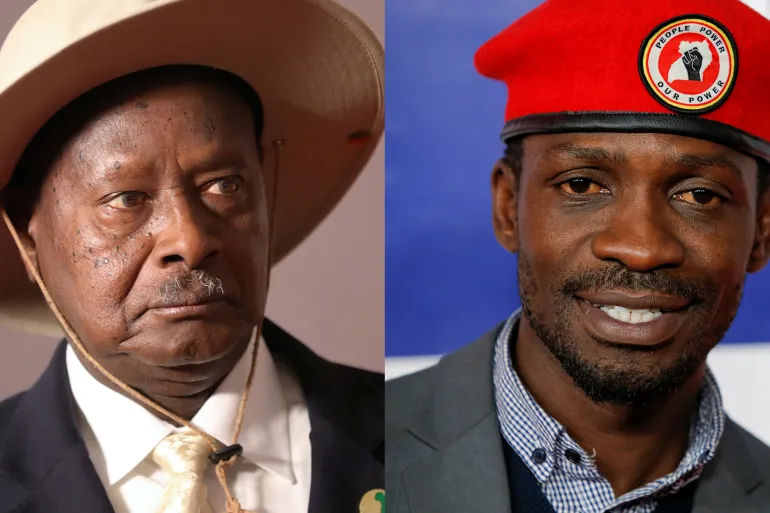
Uganda sets January 15 2026 election date as President Museveni faces Bobi Wine in a high-stakes vote watched globally.
KAMPALA, Oct. 23, 2025 — Uganda’s Electoral Commission on Wednesday announced that national elections will take place on January 15, 2026, setting the stage for another political showdown between President Yoweri Museveni and opposition leader Bobi Wine.
The poll date, confirmed in an official statement posted on the commission’s website, starts a high-stakes countdown for Africa’s third-longest-serving leader. Museveni, 81, has ruled Uganda since 1986 and is widely expected to seek a seventh elected term under the banner of the National Resistance Movement (NRM).
A tightening political field
Analysts say Museveni’s decision to run again could deepen tensions in a country where calls for leadership transition have grown louder. “The next election will test Uganda’s institutions more than any before,” said Moses Khisa, a political scientist at Makerere University. “The stakes are enormous for both the regime and the opposition.”
The opposition National Unity Platform (NUP), led by musician-turned-politician Bobi Wine — real name Robert Kyagulanyi — says it will field candidates nationwide despite continued restrictions on rallies and alleged surveillance. Wine accused authorities of trying to “block meaningful political competition” and urged international observers to monitor the vote closely.
Economic backdrop and investor concern
The announcement comes as Uganda prepares to become one of East Africa’s new oil producers, with commercial drilling expected to start in 2026. French energy major TotalEnergies and China’s CNOOC are leading a $10 billion oil project in Uganda’s Albertine region. Political instability or unrest could delay the project’s timeline and rattle investor confidence.
According to the Bank of Uganda, inflation has remained stable around 4.7%, and GDP is forecast to grow by 5.5% in 2025, supported by construction and services. But economists warn that pre-election uncertainty could slow private investment and push up fiscal spending. “Governments often loosen spending controls ahead of elections, and that can put pressure on the shilling,” said Razia Khan, Chief Economist for Africa at Standard Chartered.
The Ugandan shilling currently trades at about 3,720 per U.S. dollar, slightly weaker than last month, reflecting increased dollar demand from importers and cautious sentiment among foreign investors.
Governance record under scrutiny
Museveni’s supporters credit him with maintaining stability in a volatile region and overseeing infrastructure growth, including new highways and hydropower projects financed partly by China Exim Bank. But critics say his long rule has eroded civil liberties, weakened institutions, and centralized power within the presidency.
Uganda’s constitution once limited presidents to two terms, but parliament scrapped that clause in 2005. Lawmakers later removed the age cap in 2017, allowing Museveni to run indefinitely. The opposition called both moves “a betrayal of the democratic process.”
Human rights groups such as Amnesty International and Human Rights Watch have accused security forces of using excessive force against protesters and journalists. Authorities deny systematic abuse, insisting that law enforcement acts within Uganda’s laws.
Tight timelines and regional implications
The electoral commission said it will publish the final register by early December, giving parties less than three months to campaign nationwide. Uganda’s rural districts, where Museveni’s support base remains strong, are expected to decide the outcome.
Observers say the election’s impact extends beyond Uganda’s borders. The country plays a key role in regional security through its involvement in East African Community missions in Somalia and South Sudan. Political unrest could complicate joint security operations and disrupt trade corridors linking Kenya, Rwanda, and the Democratic Republic of Congo.
The African Union (AU) and United Nations are expected to send observer teams once formal invitations are issued. The U.S. State Department and European Union have urged Uganda to ensure “a level playing field” for all candidates.
Opposition seeks to rally youth vote
Bobi Wine, 43, remains the face of Uganda’s youthful opposition. In 2021, he came second with 34.8% of the vote, alleging widespread fraud — claims rejected by the electoral body. His message of change still resonates with Uganda’s median age of 16.3 years, one of the youngest populations in the world.
“Uganda’s young people want jobs and fairness, not fear,” Wine told reporters at his party headquarters in Kampala. “This election will define whether our nation moves forward or stays stuck in the past.”
Rising global attention
International investors and diplomats are watching closely. Uganda’s stability has made it a key partner for the World Bank and IMF, both of which resumed major lending this year after a freeze over human-rights concerns.
“Uganda matters to the region’s macroeconomic outlook,” said Mumbi Seraki, an Africa analyst at Moody’s Analytics. “If the elections trigger unrest, that could ripple through the EAC’s investment climate.”
Elections & Political Transitions
Somalia Backs One-Person, One-Vote Elections
The nationwide voter registration campaign signals a historic shift in Somali politics. Citizens will now directly choose their leaders, replacing decades of clan-based power-sharing.
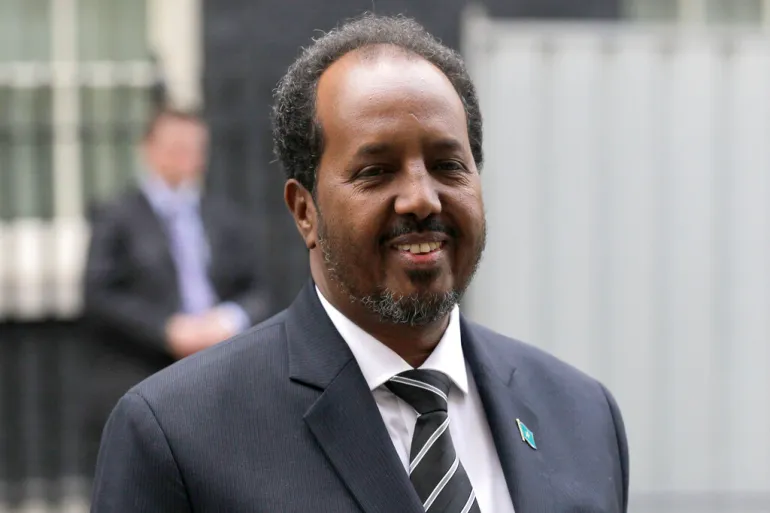
Somalia’s President Mohamud vows to end clan-based voting, urging parliament to ensure universal suffrage ahead of 2026 elections.
Somalia Backs One-Person, One-Vote Elections
MOGADISHU, Sept. 29, 2025 — Somalia’s President Hassan Sheikh Mohamud has ruled out a return to clan-based, indirect elections. He said the country’s political future depends on universal suffrage.
Somalia launched its nationwide voter registration drive in April,paving the way for its first one-person, one-vote elections since 1969.
Meanwhile, speaking at the opening of the 7th session of the 11th Parliament in Mogadishu, Mohamud cited the nationwide voter registration drive. He said it proves citizens are ready to vote directly.
“Those still dreaming of indirect elections should look to the millions already registered in Mogadishu,” Mohamud said. “This is the people speaking. They are ready, willing, and determined to vote.”
President Rejects Indirect Elections
For decades, Somalia used indirect elections under the 4.5 formula. Four major clans received equal representation. Minority clans shared a half-vote. Although the system offered stability, it sidelined ordinary citizens.
Mohamud warned that attempts to extend terms or revive clan-based voting would weaken Somalia’s democratic transition. Therefore, he urged parliament to speed up the constitutional review. In addition, he called for passing electoral laws before the parliamentary term ends in April 2026. This would make reforms irreversible.
Shift from Clan-Based Politics
In August 2024, Somalia’s cabinet approved a bill restoring universal suffrage. Citizens can now vote directly for lawmakers and the president. This replaces the old system where clan elders and lawmakers made decisions.
Analysts say the reform is a major step toward democracy. Furthermore, Somalia has long struggled with conflict and elite-driven politics.
Nationwide Voter Registration Underway
The voter registration campaign began in April 2025 in Mogadishu and later expanded nationwide. Participation has been strong. Nearly one million residents in the capital have registered for municipal elections on October 30, 2025.
Abdikarim Ahmed Hassan, chair of the National Independent Electoral and Boundaries Commission, said the turnout is a “clear signal that the public is ready to vote.” In addition, authorities view it as a test of nationwide readiness for one-person, one-vote elections.
Call for Parliamentary Action
Mohamud stressed that parliament must finalize electoral laws and constitutional amendments soon.
“The voter registration is a message. It is the people speaking. They are ready, willing, and determined to vote,” he said. Therefore, legislative action is crucial to safeguard the transition.
Challenges to Electoral Reforms
The transition still faces several hurdles:
- Security Risks: Militant group al-Shabaab controls parts of southern Somalia. They threaten polling stations and government offices.
- Regional Tensions: Federal states, including Puntland, fear centralization and resist reforms.
- Institutional Weakness: Electoral bodies, courts, and local administrations remain underfunded. This raises concerns about fair elections.
- Logistical Challenges: Voter cards, transport, and polling site accessibility remain issues.
However, authorities are working to address these challenges before 2026.
International Implications
Somalia’s reforms are closely watched by international partners. Donors such as the United States, the European Union, and the United Nations are monitoring progress. Credible elections are seen as essential for stability. They also help attract investment.
The World Bank ranked Mogadishu Port as East Africa’s most efficient. As a result, improving governance and infrastructure could support the upcoming elections.
Looking Ahead to 2026 Elections
Somalia is preparing for its first nationwide direct elections in modern history. These elections aim to end decades of clan-based arrangements.
President Mohamud’s push for one-person, one-vote shows his commitment to democracy. Furthermore, the next 18 months are critical for addressing security, political, and logistical challenges.
“The voter registration is more than technical. It is the people speaking. It shows the faith of our nation in its own democracy,” he said.
Elections & Political Transitions
Somaliland Diaspora Celebrates 65 Years Independence
The Somaliland diaspora marked 65 years of independence with vibrant cultural celebrations across the globe. From Cardiff to other international cities, communities showcased music, cuisine, and traditions. The events symbolized both remembrance and cultural pride.
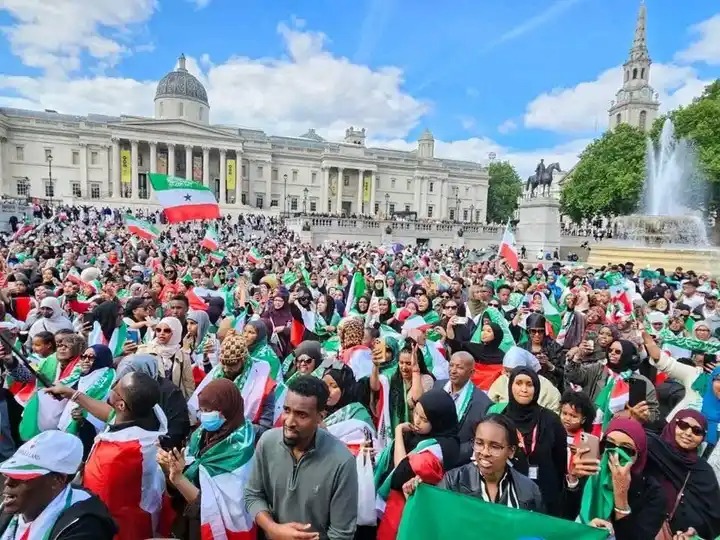
Somaliland diaspora marks 65 years of independence with global cultural events, highlighting identity and quest for recognition.
Somaliland Diaspora Marks 65 Years of Independence
The Somaliland diaspora has marked the 65th anniversary of its independence in 1960 with vibrant cultural celebrations across the globe. Between 26 and 29 August, communities came together to reflect on the region’s history and showcase its rich traditions.
In Cardiff, Wales, the Somaliland-Welsh community hosted a colorful event filled with traditional music, authentic cuisine, and multilingual speeches in Somali, English, and Welsh. The gathering highlighted the community’s dual identity and heritage, blending cultural pride with integration into Welsh society.
For the diaspora, these celebrations were not only about remembrance but also about reaffirming Somaliland’s place in global cultural networks. The events underscored how diaspora communities act as bridges between Somaliland and the world, preserving traditions while fostering cross-cultural understanding.
While Somaliland remains unrecognized internationally,some countries like Ethiopia recognize the horn of africa state with the relationship shaking the region. It’s people continue to assert their history and identity through such commemorations. For many, this anniversary served as both a reminder of past struggles and a declaration of their enduring quest for global acknowledgment.
-

 Politics, Governance & Regional Affairs6 days ago
Politics, Governance & Regional Affairs6 days agoRaila Odinga’s Death Tests ODM Unity
-

 Celebrities, Creatives & Public Figures7 days ago
Celebrities, Creatives & Public Figures7 days agoCaptain John Kiniti: Kenya’s First African Pilot
-

 Regional Security & Peacebuilding7 days ago
Regional Security & Peacebuilding7 days agoKabila’s Nairobi Meeting Deepens DRC–Kenya Rift
-

 Banking, Finance & Economic Policy4 days ago
Banking, Finance & Economic Policy4 days agoMacharia to Lead Sidian Bank’s Revival
-

 Celebrities, Creatives & Public Figures5 days ago
Celebrities, Creatives & Public Figures5 days agoWPP-Scangroup Names Owusu-Nartey as CEO
-

 Banking, Finance & Economic Policy6 days ago
Banking, Finance & Economic Policy6 days agoKenya Banks Poised for Strong Q4 Rebound
-

 Human Rights & Social Justice6 days ago
Human Rights & Social Justice6 days agoRwanda Targets Exiled Critics with Sanctions
-

 Banking, Finance & Economic Policy5 days ago
Banking, Finance & Economic Policy5 days agoEthiopia Caps Foreign Bank Ownership at 49%

